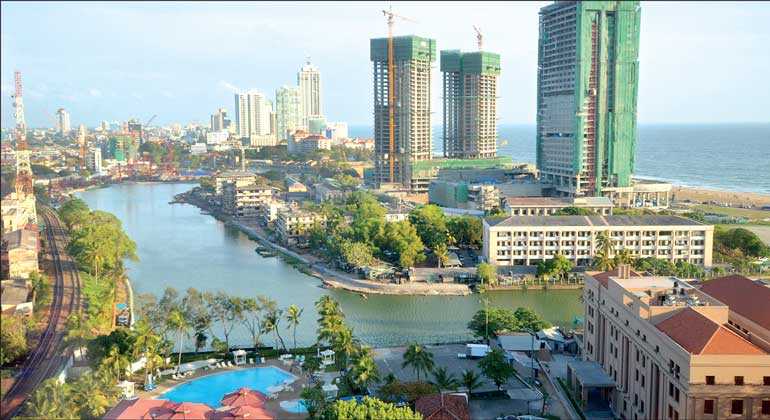Tuesday Feb 24, 2026
Tuesday Feb 24, 2026
Saturday, 14 November 2020 00:05 - - {{hitsCtrl.values.hits}}

To enter and remain competitive in the European market, Sri Lanka needs to transform into a financial, technological, and economic hub in the Indian Ocean. To do so, Sri Lanka needs to improve the business environment for investments, encourage innovation, produce high-quality goods, move towards sustainable production concepts, improve the quality of infrastructure services in the country, and enhance the efficiency of cross-border procedures
 The United Kingdom (UK) formally left the European Union (EU) on 31 January and is now in a transition period till 31 December during which certain agreements such as trade and freedom of movement with the remaining EU27 (henceforth EU) are discussed and finalised.
The United Kingdom (UK) formally left the European Union (EU) on 31 January and is now in a transition period till 31 December during which certain agreements such as trade and freedom of movement with the remaining EU27 (henceforth EU) are discussed and finalised.
The EU and the United Kingdom are important economic and diplomatic partners of Sri Lanka. Four years on from the Brexit referendum, the future relationship between the UK and EU however remains unclear. It is therefore of strategic importance for Sri Lanka to tap into the opportunities presented through the re-alignment of economic and diplomatic relationships in Europe and to develop a stronger relationship with the remaining EU member countries.
This article aims to give an overview of Sri Lanka’s relations with the EU in the post-Brexit period and to identify how Sri Lanka can going forward strengthen ties with the EU. First, it identifies the current economic ties with the EU and secondly analyses why Sri Lanka can benefit from deeper linkages with the EU. Thirdly, it highlights policy initiatives to further links with the EU.
Current relations between Sri Lanka and the EU
Diplomatic ties between the EU and Sri Lanka have grown closer during the last few years, with high-level institutional dialogues having taken place regularly between Colombo and Brussels. The EU-Sri Lanka Joint Commission seeks to build an equal partnership between the EU and Sri Lanka by discussing bilateral and multilateral matters such as economic and development cooperation.
Germany, Poland, the Netherlands, and Denmark are currently sharing military ties with the Sri Lankan Army. In the post Brexit period, most of the EU member countries have already announced to strengthen military ties with Sri Lanka to secure their spot in the Indian Ocean and to benefit from Sri Lanka’s strategic position.
The EU and Sri Lanka are closely interlinked economically. Said economic ties however leave room for deeper integration. Sri Lanka alongside other developing countries has historically benefited from the EU’s Generalised Scheme of Preferences (GSP) since its inception in the 1970s. This scheme reduces import duties from products entering the EU market in exchange for Sri Lanka abiding by international values and principles, including labour and human rights.i In 2010 Sri Lanka lost access to the GSP+ scheme due to the non-effective implementation of the UN human rights conventions but regained access in 2017. ii
The EU is by far the biggest export market for Sri Lanka. In 2019, the country exported goods worth $ 2.2 b to the region (22% of total exports to the world) and imported goods worth $ 1.7 b from the EU (8% of total imports from the world). Out of the EU member countries, Sri Lanka boasts a trade surplus with 17 member countries. In terms of total trade, Sri Lanka’s largest EU trading partners are Germany (25%), Italy (23%), France (13%), Belgium (10%) and the Netherlands (7%).iii
Sri Lanka shares Bilateral Investment Treaties (BITs) with a variety of EU countries including France, Germany, Denmark, Finland, Sweden, Czechia, the Netherlands, Romania and Italy. In 2018, Sri Lanka received $ 90 million Foreign Direct Investment (FDI) from the EU1, accounting for 5.6% of total FDI received. In comparison, India and China accounted for a 65% share respectively; highlighting Sri Lanka’s potential to attract additional FDI from EU member countries.iv
Tourism has long been an important element of Sri Lanka’s economy, delivering substantial foreign exchange and employment opportunities for the country. Sri Lanka received roughly 712,600 tourist arrivals from the Europe in 2018 (50.8% of total tourist arrivals), with Germany being the largest source market with 6.7% of total tourist arrivals.v About 300 Sri Lankans have immigrated to Europe in 2017, with the majority being “skilled” workers.
In terms of knowledge exchange and cooperation, the EU and Sri Lanka engage through a variety of science and education exchange programs such as ‘Horizon 2020’, the largest science and research program in the world; the ‘Erasmus Plus’ exchange program and other capacity building programs. What is more, Sri Lankans have been awarded a series of EU scholarships and the EU has supported ‘Colombo scope 2019’, a platform for local artists in Sri Lanka.
Over time, the EU has provided important development and humanitarian assistance to Sri Lanka. As such, EUR 40 million are provided to finance the capacity development of local authorities, EUR 30 million are granted to strengthen poor communities and develop, EUR 30 million is allocated for the modernisation of the agriculture sector, whilst another EUR 15 million is provided for building institutional capacities and reducing language barriers to strengthen reconciliation efforts during the post Brexit period. In addition, the European Investment Bank (EIB) allocated EUR 50 million to improve and expand sewage networks in Colombo.vi Against the COVID-19 outbreak and its significant health economic and social impact on Sri Lanka, the EU has provided a EUR 22 million grant to the country.vii
Why should Sri Lanka strengthen ties with the EU?
The EU is the largest economy in the world, comprising 27-member states with diverse cultures, economies, and societies. It is the world’s largest trading bloc and leading trader of manufactured goods and services.viii
Further, the EU is one of the most open economies in the world and remains committed to free trade, with the average applied tariff for imported goods being comparatively low relative to other federations (e.g. NAFTA, MEROCSUR, ASEAN.)ix, emphasising Sri Lanka’s opportunity to benefit from deeper economic integration with the EU.
Sri Lanka can also benefit from the EU’s globally recognised standing as a science and knowledge hub and collaborate with the EU through targeted exchange programs. Other areas for cooperation comprise trade related assistance projects and financial aids programs.
Strengthening ties with the EU
In order to strengthen ties with the EU, it is important to increase Sri Lanka’s presence in the region by adding to the already established 11 permanent diplomatic missions in the EU. These missions should engage in Sri Lanka’s Economic Diplomacy program and have access to personnel with good business knowledge, soft skills and fluency in prominent European languages such as German, Italian, Spanish and French. Currently, linguistic differences between Sri Lanka and EU countries impede bilateral commercial ties. Therefore, it is essential to develop language capacity and cultural awareness in Sri Lanka by providing specific training to students.
To enter and remain competitive in the European market, Sri Lanka needs to transform into a financial, technological, and economic hub in the Indian Ocean. To do so, Sri Lanka needs to improve the business environment for investments, encourage innovation, produce high-quality goods, move towards sustainable production concepts, improve the quality of infrastructure services in the country, and enhance the efficiency of cross-border procedures.
Designing and implementing a coherent trade strategy alongside promoting the National Export Strategy (NES) industries will help Sri Lanka strengthen its economic linkages with the EU. NES seeks to improve firms’ abilities to export and compete in foreign markets, empowering the emergence of new export industries and services beyond the traditional export industries of apparel, tea, gems and rubber.
Sri Lankan companies should move forward by implementing sustainable production concepts such as green production and organic production. Sri Lanka should produce high quality products, whilst following ethical practices. Small and Medium Enterprises need to be encouraged to work more efficientlyx. Moreover, Sri Lanka should address infrastructure deficiencies with regards to roads, air travel, and marine transportation.
Further, Sri Lanka loses GSP+ scheme access in 2023, increasing the relative prices of Sri Lankan exports to the EU. Therefore Sri Lanka needs to make sure that preferential rates are provided post 2023.
Additionally, and to boost inbound tourism, Sri Lanka should develop better air connectivity and promote the island as a favourable tourist destination.
Conclusion
Brexit and the spread of COVID-19 trigger countries to rethink their current linkages with other partners in the world. The EU is one of Sri Lanka’s major and longstanding development partners. Sri Lanka has the potential to leverage on its existing ties with EU nations for deeper integration, also helping the island country to navigate the uncertainties associated with the global COVID-19 pandemic.
Additionally, Sri Lanka should also seek to extend ties to non-EU member countries such as Norway and Switzerland to diversify its economic and diplomatic ties, thereby spreading systemic risk. In this regard, a well-coordinated approach and policy directive is required by the Sri Lankan Government and associated authorities.
[Udeshika Jayasekara is a Research Assistant at the Institute of National Security Studies Sri Lanka (INSSSL), national think tank under the Ministry of Defence. The opinion expressed is her own and not necessarily reflective of the institute. This article was originally published by Lakshman Kadirgamar Institute, https://lki.lk/blog/post-brexit-sri-lanka-europe-relations/]
Footnotes
1This includes investments from the Netherlands, Italy, Austria, Sweden, Belgium, Germany and France.
i European Commission. (2020). Generalized Scheme of Preferences (GSP). [Online] Available at:
https://ec.europa.eu/trade/policy/countries-and-regions/development/generalised-scheme-of-preferences/%20[Accessed%2030%20June%202020].
ii Julin, A. (2019) EU-Sri Lanka Trade Relations - eccsl. [Online] Available at: http://www.eccsl.lk/sites/default/files/Presentation%20EUSri%20Lanka%20Trade%20relations%20-%20Andreas%20Julin%20DG%20Trade%20European%20Commssion.pdf
[Accessed 20 April 2020].
iii International Money Fund. (2020). Direction of Trade Statistics - IMF Data. [Online] Available at: https://data.imf.org/?sk=9D6028D4-F14A-464C-A2F2-59B2CD424B85
[Accessed 12 April 2020].
iv Board of Investment of Sri Lanka. (2019). Foreign Direct Investments (FDI) Inflows - Country-wise Breakdown [Online] Available at: https://www.cbsl.gov.lk/sites/default/files/cbslweb_documents/publications/annual_report/2019/en/15_Appendix.pdf
[Accessed 01 July 2020].
v Sri Lanka Tourism Development Authority (2019). Annual-statistical-report. [Online] Available at: https://sltda.gov.lk/storage/documents/0cb228cd03762f638bd515fe83edd453.pdf
[Accessed 16 April 2020].
vi European Commission. (2020). EU – Sri Lanka development cooperation. [Online] Available at: https://ec.europa.eu/commission/presscorner/detail/de/MEMO_16_810
[Accessed 20 April 2020].
vii European Commission. (2020). Covid-19: European Union provides EUR 22 million grant to Sri Lanka. [Online] Available at: https://eeas.europa.eu/delegations/sri-lanka/77364/covid-19-european-union-provides-eur-22-million-grant-sri-lanka_en
[Accessed 30 June 2020].
viii European Commission. (2019). EU position in world trade - Trade - European Commission. [Online] Available at: https://ec.europa.eu/trade/policy/eu-position-in-world-trade/
[Accessed 11 April 2020].
ix Gowland, D. (2016). Britain and the European Union. Abingdon, United Kingdom: Taylor & Francis.
x Samarawickrama, M. (2017). EU – Sri Lanka trade partnership – Is there scope for further expansion?. The Island. [Online] Available at: http://www.island.lk/index.php?page_cat=article-details&page=article-details&code_title=168567 [Accessed 02 July 2020].